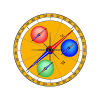Conveners
Session III-b
- Philip George Ratcliffe (INFN Milano Bicocca)
Anselm Vossen
(Indiana University)
13/12/2017, 11:00
The precise knowledge of fragmentation functions is necessary for our understanding of hard scattering processes where particles in the final state are detected in terms of factorized pQCD cross-sections.
Studying electron-positron annihilation provides the cleanest access to fragmentation functions. In particular, our knowledge of polarization dependent fragmentation functions have...
Gunar Schnell
(University of the Basque Country UPV/EHU)
13/12/2017, 11:40
Fragmentation functions, describing the formation of hadrons from partons, are an indispensable tool in the interpretation of hadron-production data, e.g., in the investigation of nucleon structure via semi-inclusive deep-inelastic scattering. The cleanest process to access fragmentation functions is hadron production in electron-positron annihilation. However, little information can be...
Aram Kotzinian
(INFN Turin)
13/12/2017, 12:05
We present our calculations of the polarization- and transverse momentum dependent single hadron fragmentation functions (FF) and dihadron fragmentation functions (DiFF) using the most recent quark-jet model. In this extension of the model the complete description of a polarized quark state after each step of hadron formation was given, based on a self-consistent treatment of the quark...
Emanuele Roberto Nocera
(Higgs Centre for Theoretical Physics, School of Physics and Astronomy, University of Edinburgh)
13/12/2017, 12:30
I review the current status of the determination of the collinear helicity and transversity parton distribution functions from a global QCD analysis of experimental measurements. I highlight the most recent achievements and outline the open issues to be addressed in the future.

